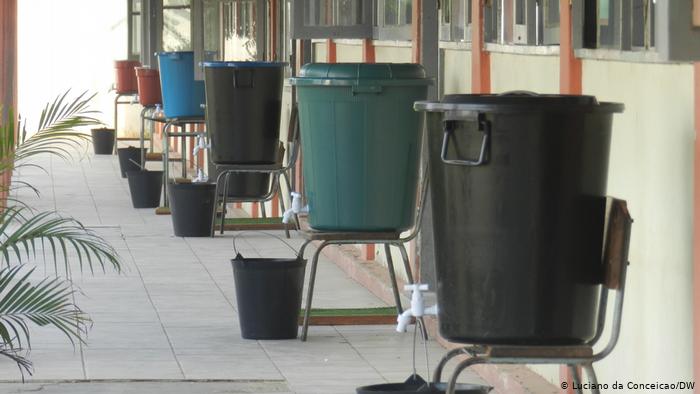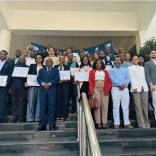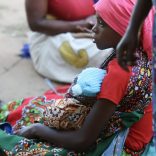Mozambique: CTA participates in the graduation ceremony of the Sasol Local Business and Supplier ...
Covid-19: Suspected over-invoicing of works in Mozambican schools – DW

Improvised hand-washing buckets inInhambane schools have no water supply [Photo: DW]
- ‘The “million-dollar” contracts for the improvement of sanitation conditions in secondary schools in Inhambane were awarded without a public tender as elsewhere in the country. The Inhambane contracts all went to one Maputo-based company. CIP speaks of lack of transparency in such direct awards. Local contractors cry foul. Read the DW Africa report.
Schools in the province of Inhambane, southern Mozambique, have re-started classes without any improved sanitation conditions.
In September of this year, the Ministry of Public Works, Housing and Water Resources chose the company MHL Construções e Logística to build 14 toilet blocks and one water supply system and rehabilitate 30 toilets in six Inhambane secondary schools.
The contract, worth almost 160 million meticais (€1.9 million) was signed with the Maputo company directly, without a public tender. So far, however, the contractor has failed to deliver any of the works contracted, and classes have resumed without the declared minimum standards being in place.
Failure harms schools
Domingos Chibindji, spokesperson for the Provincial Directorate of Education in Inhambane, told DW Africa that there was still no water for hand washing, and that the company had not yet started work.
“The biggest constraint in this process is the availability of water. So far, there are no completed toilets, and you can see that we are still a little behind in this process,” he stressed.
Paulito Pereira de Goveia, director of the 29th September Secondary School in Maxixe, criticises the delay. “At the moment, we are not benefitting from the rehabilitation announced at Ministry level as guaranteeing the resumption of classes. We had to pay for some improvement to our toilets out of the school’s own funds,” he said.
Local businesses were excluded
No local companies were contracted for the rehabilitation of secondary schools toilets in Inhambane, leading entrepreneurs there to express their indignation in a letter to the State Secretariat in the province.
Inocêncio Bambo, head of the Inhambane Association of Contractors, says that local companies hoped to take over some works, for which they are amply qualified.
“We sent a letter to the State Secretariat, with copies to other institutions, expressing this, and we are waiting [for a reply]. The local contractors have already shown that they have the capacity to carry out these works,” he said.

Lack of transparency
Direct awards are causing huge losses, the CIP says. The rehabilitation of a bathroom in a secondary school is costing the Mozambican state up to 7 million meticais (more than €80,000), 24 times the normal price.
Egas Jossai, a CIP researcher, says that the awards the government made lacked transparency and civil society monitoring, further accusing the government of putting the lives of teachers and students at risk.
“From the beginning, this process was not transparent. The state should have allocated the works to local companies so as to ensure speedy rehabilitation. We, as parents and guardians, will not accept putting our children at risk of contracting Covid-19,” he stressed.
Análise Das Adjudicações Nos Sectores De Saúde E Água E Saneamento No Âmbito Da Covid-19:
AJUSTES DIRECTOS REPRESENTAM ALTO RISCO DE CORRUPÇÃO
Leia o texto na íntegrahttps://t.co/ru77eHVTS1Veja a tabela:https://t.co/ypUdFlRGr1
— CIP-Mozambique (@CIPMoz) October 14, 2020












Leave a Reply
Be the First to Comment!
You must be logged in to post a comment.
You must be logged in to post a comment.